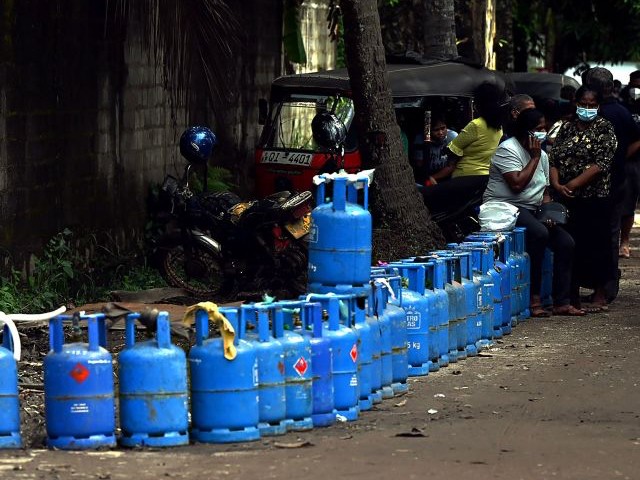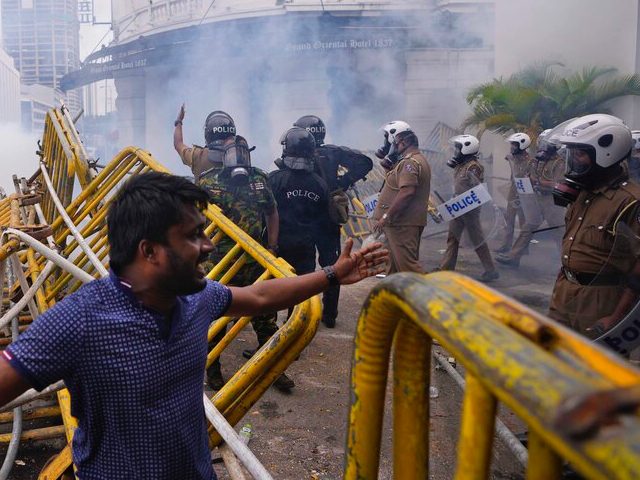The prime minister of Sri Lanka, Ranil Wickremesinghe, declared in remarks to the nation’s parliament on Wednesday that its economy had “completely collapsed.”
The socialist country is facing the worst economic crisis in its modern history, prompting acute shortages of food, medicine, gasoline, natural gas, and other core goods since March. Lavish spending under the Rajapaksa dynasty’s rule coupled with socialist mismanagement of the economy, a “green” policy that banned chemical fertilizers and made the country reliant on food imports, and trade deals in which Sri Lanka took out predatory loans from China all contributed to the nation’s rapid decline.
Wickremesinghe, who became prime minister for a second time after predecessor Mahinda Rajapaksa resigned in May, told parliament that the government has no way of purchasing petroleum fuels (gasoline and diesel) because oil companies and governments do not trust that Sri Lanka will be able to pay.
The government of President Gotabaya Rajapaksa, Mahinda’s brother, had announced this weekend that the country had run out of gasoline entirely and would not receive another shipment until June 23. Wickremesinghe’s remarks appeared to indicate that the government could not guarantee that any gasoline would arrive by that day.
“We are now facing a far more serious situation beyond the mere shortages of fuel, gas, electricity and food. Our economy has completely collapsed,” Wickremesinghe proclaimed in an address to Parliament. “That is the most serious issue before us today.”
Wickremesinghe remarked that the state oil company, Ceylon Petroleum Corporation, is currently suffering from such a poor reputation that no one will sell it any fuel – hinting that Sri Lanka may not have gasoline anywhere in the country in the foreseeable future.

People queue up to buy Liquefied Petroleum Gas (LPG) cylinders in Colombo on June 5, 2022. (AFP via Getty Images)

People queue to buy Liquefied Petroleum Gas (LPG) cylinders in Colombo on April 11, 2022. (ISHARA S. KODIKARA/AFP via Getty Images)
“Currently, the Ceylon Petroleum Corporation is $700 million in debt,” he narrated. “As a result, no country or organization in the world is willing to provide fuel to us. They are even reluctant to provide fuel for cash.”
Wickremesinghe chastized the Rajapaksa government for failing to address the many signs of economic downfall prior to the current crisis while the nation could still avoid tragedy.
“If steps had at least been taken to slow down the collapse of the economy at the beginning, we would not be facing this difficult situation today,” Wickremesinghe said. “But we lost out on this opportunity. We are now seeing signs of a possible fall to rock bottom.”
The current prime minister served in the same capacity from 1993 to 1994, then again from 2001 to 2004, and most recently from 2015 to 2019. During his penultimate tenure, Wickremesinghe served under Gotabaya Rajapaksa’s predecessor Maithripala Sirisena, making him a top official during Sri Lanka’s signing of predatory deals with China under the latter’s Belt and Road Initiative (BRI). Sri Lanka joined the BRI with a massive loan deal in 2016 that prompted nationwide protests from those who feared the deal would crater the country’s fragile economy and give China too much influence over its government.
Sri Lankan officials promised that the loan money would go to building critical infrastructure to further the nation’s development. In reality, the ill-conceived seaport in Hambantota, far south of Colombo and distant from key trade routes, is in practice a Chinese asset for at least the next century and the promise of a job-creating industrial park around the port has fizzled. Projects like Colombo’s “Lotus Tower,” South Asia’s largest telecommunications tower, remain closed to the public and effectively useless.
Wickremesinghe ultimately left office in a messy political battle in which Sirisena attempted to replace him with Mahinda Rajapaksa, who had already served as president from 2005 to 2015.
The prime minister reportedly stated that talks with the International Monetary Fund (IMF) to address Sri Lanka’s lack of foreign currency reserves and very poor credit were the first urgent steps he hoped to take to prevent further devastation. Sri Lanka’s News First reported on Wednesday that Wickremesinghe is also hoping to secure foreign aid deals with India and America, which are sending representatives to Colombo to meet senior government officials on Thursday and next week.
The U.S. Agency for International Development (USAID) announced on Tuesday that it would offer $5.75 million in grant funding to the country to use for “cash assistance, short-term jobs, and agriculture supplies such as seeds,” according to News First.
“We are working hard to ensure that these funds directly reach the Sri Lankans who have been most severely affected by this crisis,” U.S. Ambassador to Sri Lanka Julie Chung announced.
The economic crisis has fueled an ongoing protest movement demanding Gotabaya Rajapaksa’s resignation, nicknamed “Gotagogama.” The protest movement has demanded that all government officials resign; Gotabaya is the only Rajapaksa still in power after Mahinda and two other family members in the cabinet stepped down.
Protests continued on Wednesday, attracting hundreds in the nation’s largest cities.
As of Wednesday evening, a mob had formed outside of Wickremesinghe’s home in what the Sri Lankan Daily Mirror described as a “tense situation.”
Mahinda Rajapaksa resigned after a mob burned down in home, and those of several other lawmakers and top officials, in early May.

COMMENTS
Please let us know if you're having issues with commenting.